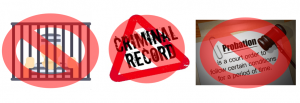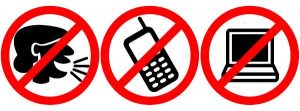Resolutions
Types of Sentences
Absolute Discharge:
- If you are found guilty of a crime or you plead guilty to a crime the judge can decide to give you an absolute discharge
- Your case is finished the day the judge gives you an absolute discharge
- An absolute discharge means NO jail time or house arrest
- You will NOT be on probation or have to follow any rules
- You will NOT have a criminal record BUT the absolute discharge will be on file/record for 1 year
- This means that you cannot get in trouble with the police for this time or else your charges could come back
- The absolute discharge is automatically removed from your file/record after 1 year
Conditional Discharge:
- If you are found guilty of a crime or you plead guilty to a crime the judge can decide to give you a conditional discharge
- A conditional discharge means NO jail time or house arrest
- You will be on probation for 1-3 years
- You will have to follow rules/conditions for 1-3 years. This is called a probation order
- You will NOT have a criminal record in the end BUT the conditional discharge will be on file/record for 3 years AFTER you finish probation
- This means that you cannot get in trouble with the police for this time or else your charges could come back
- Your record of conditional discharge is automatically removed from your file/record 3 years after probation is finished
Absolute discharge | Conditional discharge |
No jail or house arrest | No jail or house arrest |
NO Probation | Probation |
NO rules to follow | Follow rules on probation order |
You WILL NOT have a criminal record BUT discharge will be on file for 1 year | You WILL NOT have a criminal record but discharge will be on file for 3 years AFTER probation |
Suspended Sentence:
- If you are found guilty of a crime or you plea guilty to a crime the judge can decide to give you a suspended sentence
- A suspended sentence means NO jail time or house arrest
- you will be on probation for 1-3 years
- You will have to follow rules/conditions for 1-3 years. This is called a probation order
- You WILL have a criminal record in the end
- You will have to apply for a pardon to have the conviction (suspended sentence) removed from your record
Conditional Sentence:
- If you are found guilty of a crime or you plea guilty to a crime the judge can decide to give you a conditional sentence
- A conditional sentence means NO jail time in a jail
- You WILL have house arrest meaning that you will have to follow strict rules and stay in your house
- You may have probation after your conditional sentence
- You WILL have a criminal record in the end
- You will have to apply for a pardon to have the conviction (conditional sentence) removed from your record
Intermittent Sentence:
- If you are found guilty of a crime or you plead guilty to a crime the judge can decide to give you an intermittent sentence
- An intermittent sentence means you will have to go to jail but not everyday (For example, only go to jail on the weekends)
- When you are not in jail you will have to follow rules/conditions.
- This is called a probation order
- You WILL have a criminal record in the end
- You will have to apply for a pardon to have the conviction (intermittent sentence) removed from your record
Suspended Sentence (probation) | Conditional Sentence (house arrest) | Intermittent Sentence (weekend) |
No jail or house arrest
| House arrest (have to follow strict rules like in jail) | Jail time BUT not everyday (example: jail on weekends) |
Probation | You may have probation after conditional sentence | |
Follow rules on probation order | When you are not in jail you will have to follow rules/conditions on a probation order | |
You WILL have a criminal record | You WILL have a criminal record | You WILL have a criminal record |
You will have to apply for a pardon (record suspension) to have the conviction removed from your record | You will have to apply for a pardon (record suspension) to have the conviction removed from your record | You will have to apply for a pardon (record suspension) to have the conviction removed from your record |
Fine
- If you are found guilty of a crime or you plea guilty to a crime the judge can decide to have you pay a fine (different from restitution or a charitable donation)
- A fine is a set amount of money that you pay to the Court as a penalty for committing a crime
- A fine can be added to another penalty, such as jail or probation
- If you can’t pay the fine in time you can request the courts for an extension
- You WILL have a criminal record in the end
- You will have to apply for a pardon to have the conviction (fine) removed from your record
Probation
- If you are found guilty of a crime or you plea guilty to a crime the judge can decide to give you probation
- Probation is a court order that tells you to follow certain rules for a period of time
- These conditions are written on a probation order
- The probation order can be from 1-3 years
- Some conditions on a probation order could include:
- Keep the peace and be of good behaviour
- Contact your probation officer when you are told (example-weekly)
- Tell the court or probation officer if you change your name, address or telephone number
- Do not buy, carry or drink alcohol
- Go to counselling
- Do not contact a certain person or people
| Fine | Probation |
| Set amount of money to pay the courts | Probation is a court order that tells you to follow certain rules for a period of time |
A fine can be added to another penalty, such as jail or probation *If you can’t pay the fine in time you can request the courts for an extension | Follow rules on probation order for 1-3 years |
| You WILL have a criminal record | You WILL have a criminal record |
| You will have to apply for a pardon (record suspension) to have the conviction removed from your record | You will have to apply for a pardon (record suspension) to have the conviction removed from your record |
Alternative Resolution Community or Mental Health Court & Drug Treatment Courts
- These types of courts offer diversions or reduced sentences to persons who suffer from mental health or addictions challenges that are willing to do up front work including counselling, community service, etc.
- The person will typically appear in court to provide progress updates.
- The sentencing is completed at the end of the process and charges are either withdrawn (diversion) or sentence is reduced (court support track).
Mental Health Diversion
- Mental health diversion is resolving your charges without you pleading guilty or going to trial.
- The Crown Attorney decides if you are approved for mental health diversion.
- You will have to do some up front work to be approved for a mental health diversion.
- Examples of this upfront work can include but are not limited to:
- Counselling
- Referrals to outside programs
- Seeing a doctor or psychiatrist
- At the end, if you successfully complete your mental health diversion you will not have a criminal record.
Court Support or Reduced Sentences:
- In these scenarios, the upfront work is the same but the person has to plead guilty.
- Sentencing will then be delayed until they complete their upfront work.
- The end result will be a lesser sentence than was first being asked for by the Crown Attorney.
- You may have a criminal record at the end of this process but if so, it will be for a less serious charge.
Peace Bond
What is a Peace Bond?
- Legal agreement or contract to follow certain rules
- Signed by you and a Judge
How long does a Peace Bond typically last?
- 12 months
What Rules do I follow on a Peace Bond?
- Examples include:
- Keep the peace and be of good behaviour
- Do not contact a certain person
- Do not possess any weapons
Case Study
Derek meets with Canadian Mental Health Association to complete an intake and develop his mental health diversion plan.
Derek’s mental health diversion plan includes:
- Counselling
- An anti-theft program
- To enroll in an Adapted Dialectical Behaviour Therapy Justice Group (A-DBT Justice Group)
He will complete his diversion plan over the next 3-6 months. His next court date is scheduled in two months where he will have to provide a progress update.
At that court appearance, Derek’s court matter was adjourned (moved to) a new date to continue the work he is doing.
At his four month update, CMHA provided information to the court that he had completed all requirements of his diversion plan and the Justice of the Peace agreed to withdrawal his charges.
Derek no longer has to attend court and will not have a criminal record. He has completed his mental health diversion successfully.
Derek continues to meet with his counsellor and practice the skills he learned in his A-DBT Justice Group with his support staff in the group home.





